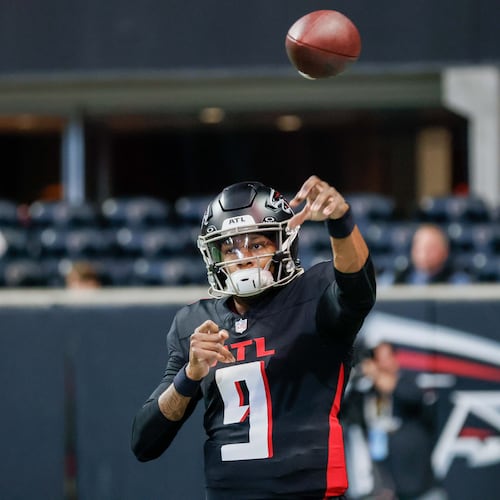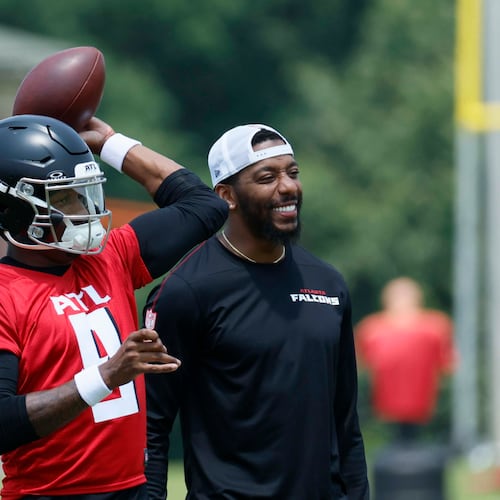For almost two years, representatives of the Georgia World Congress Center Authority and the Atlanta Falcons have been negotiating a deal on a proposed downtown stadium. On Monday morning, the GWCCA’s board is expected to vote on the business terms of an agreement. If the nonbinding term sheet — a 24-page document — is approved, negotiations would continue toward a binding and more detailed memorandum of understanding.
Approval on Monday would not signal that a deal is done, but it would be a significant milestone in the protracted negotiations.
Based on documents obtained under the state’s Open Records Act and interviews with people involved in the process, The Atlanta Journal-Constitution has compiled a summary of the major points of the proposed deal. All words within quotation marks are taken directly from the proposed term sheet.
What would be built?
“A new operable-roof, state-of-the-art, multi-purpose stadium on (the) GWCCA campus that will serve as home of the Atlanta Falcons … and will host numerous other sporting, entertainment, convention and civic events.”
Who would own the stadium?
The Georgia World Congress Center Authority, a state agency
Who would operate it?
The Falcons, under terms of a 30-year license agreement with the GWCCA
What is the timetable?
“It is the goal to have the (stadium) completed for the 2017 NFL season.”
Where would it be built?
“(The stadium) will be situated on the GWCCA campus on one of two proposed site locations, either north or south of the Georgia Dome.” The south site, which has gotten the most attention since the spring, is adjacent to the Dome, near the intersection of Martin Luther King Jr. Drive and Northside Drive. The north site, which was the focus during the first year-plus of negotiations, is about a half mile from the Dome, near the intersection of Northside Drive and Ivan Allen Jr. Boulevard. A final decision on the site has been deferred until the negotiation of the memorandum of understanding early next year.
What would it cost?
The term sheet does not specify a price for the stadium because design work has not been done. “Assurances of a maximum price … will be established before any GWCCA debt is issued.” Cost estimates in prior GWCCA-commissioned studies have ranged from $948 million to $1.032 billion.
Who would pay for it?
According to the term sheet, the stadium would be paid for in three ways:
- Hotel/motel tax: The GWCCA would contribute, subject to governmental approvals, the proceeds of a revenue bond offering backed by the tax on hotel/motel rooms in the city of Atlanta and Fulton County through the year 2050. The term sheet does not specify the amount that would be raised by the bond offering, although the GWCCA previously has projected the figure in the ballpark of $300 million. The amount "may be positively or negatively impacted" by interest rates and other factors.
- Personal seat licenses: "All net proceeds from the sale of seats rights" would go toward the stadium's cost. Personal seat licenses, sold by many NFL teams, require fans to pay one-time fees, often thousands of dollars, for the right to subsequently buy season tickets in a specific seat for the life of the building or a defined number of years. A GWCCA consultant estimated a seat-license program here might generate $100 million to $200 million, probably closer to the former.
- Falcons contribution: Other than the proceeds of the bonds backed by the hotel/motel tax, plus the seat-license sales, the Falcons "are responsible for funding the remainder of (the stadium's) costs, including cost overruns" and must "provide reasonable evidence to GWCCA of a financing plan." (Ballpark math: If the hotel-motel tax covers about $300 million and PSLs about $100 million, the Falcons would be responsible for about $600 million. The team could be eligible for up to $200 million in loans and grants from the NFL.)
What’s not included?
Two major items aren’t included in “stadium cost” as defined in the term sheet. That means the Falcons would not be responsible for these items, which would add to the taxpayers’ cost in some way:
- Off-site infrastructure improvements, such as nearby roads: "The parties agree that, upon final selection of the site, there may be offsite infrastructure costs … that will be subject to future budget considerations and a funding agreement. … Neither party assumes responsibility for such costs. … To the extent permitted by law, GWCCA may cooperate reasonably with (the team) in pursuing other possible governmental funding sources." Atlanta Mayor Kasim Reed has said such costs could push the price for the total project to $1.2 billion.
- Property acquisition: The GWCCA would be responsible for "obtaining … and providing" all property needed for the stadium site. The GWCCA would have to acquire property to build on the south site and also is in the process of attempting to acquire the Herndon Homes property near the north site, which the GWCCA already owns.
Would Falcons pay rent?
The Falcons would pay annual rent on the stadium to the GWCCA. The rent would begin at $2.5 million in the first year and would increase by 2 percent annually.
Who would cover future improvements to the new stadium?
If additional money is available from the portion of the hotel-motel tax proceeds allocated to the stadium after debt payments are made, those funds could be used for capital improvements. Otherwise, all capital improvements would be the Falcons’ responsibility.
Who would pay operating expenses?
The Falcons “will be responsible … for all costs” of operating the stadium, including utilities, insurance and maintenance.
Who would get stadium revenue?
The Falcons would retain all stadium revenue. The team’s revenue streams would include naming rights, food and beverage concessions, sponsorships, advertising, club seats and suites.
Who would get parking revenue?
The Falcons would retain revenue from a parking area on the immediate stadium site, while the GWCCA would retain revenue from other nearby parking areas it controls. A separate, detailed parking agreement is to be negotiated.
What would happen to the Georgia Dome?
“Upon final transition of operations to the (new stadium), the Georgia Dome will be demolished.”
What would be done with the Dome site?
If the stadium is built on the south site, the Georgia Dome site initially “will be converted to surface parking” for the new stadium. “The Falcons recognize that GWCCA may in the future redevelop a portion” of that parking area, “not to exceed 60,000 square feet,” for another purpose. If the new stadium is built on the north site, which is farther from the Dome, the Dome site “may be redeveloped as determined by GWCCA in its sole discretion.”
What happens to the Dome’s non-Falcons events?
The term sheet carves out special treatment for events, such as college football and basketball games, that relocate to the new stadium from the Georgia Dome. The GWCCA “will continue as the event manager” for such “Georgia Dome legacy events,” including negotiating and entering into contracts and directing event-day production. Fifteen such events are listed, including the SEC Championship football game, the Chick-fil-A Bowl and Kickoff games, Georgia State and high school football, the Bank of America Atlanta Football Classic and ACC, SEC and NCAA basketball tournaments. The term sheet also provides for the stadium to host GWCCA events, such as conventions, and Atlanta “bid events,” such as college basketball’s Final Four or college football’s national championship game.
How would personal seat licenses work?
The term sheet includes provisions for a sale of seat rights “to help fund construction,” but it does not go into detail. The Falcons would have “the right to determine the exact terms of such seat rights program, including price, term, etc.” The team has not provided information about its plans.
Would Falcons be locked in?
“The Falcons will be required to enter into a non-relocation agreement” for 30 years.
Would an MLS team play there?
The stadium will be designed to accommodate soccer. The proposed deal gives a high priority on the stadium’s booking calendar to Major League Soccer games if an MLS team “owned or controlled by the Falcons or its principals is established within 10 years” of the stadium’s opening.
Who would lead design and construction?
The GWCCA and the Falcons “will jointly participate in the selection process for the design professionals and construction team.” The Falcons or their designee “will serve as project manager” during design and construction. The GWCCA will have “monitoring rights over (the) construction.”
What’s next?
Provided the term sheet is approved, “GWCCA and the Falcons will endeavor to finalize a detailed MOU (memorandum of understanding) as expeditiously as possible.” Some complex issues, such as the site, and many details would have to be resolved as part of the MOU. Unlike the term sheet, the MOU would be a binding document.
Who must approve a deal?
The MOU “will require approval by the GWCCA’s board and (require) other applicable state governmental approvals.” Also, “the offering of hotel/motel tax revenue bonds is subject to enactment of legislation increasing GWCCA’s … debt ceiling.” The current debt ceiling is $200 million, and the issue of raising it is expected to go before the Georgia Legislature early next year. In addition, “the transaction … will require approval by the NFL.”
About the Author
Keep Reading
The Latest
Featured



